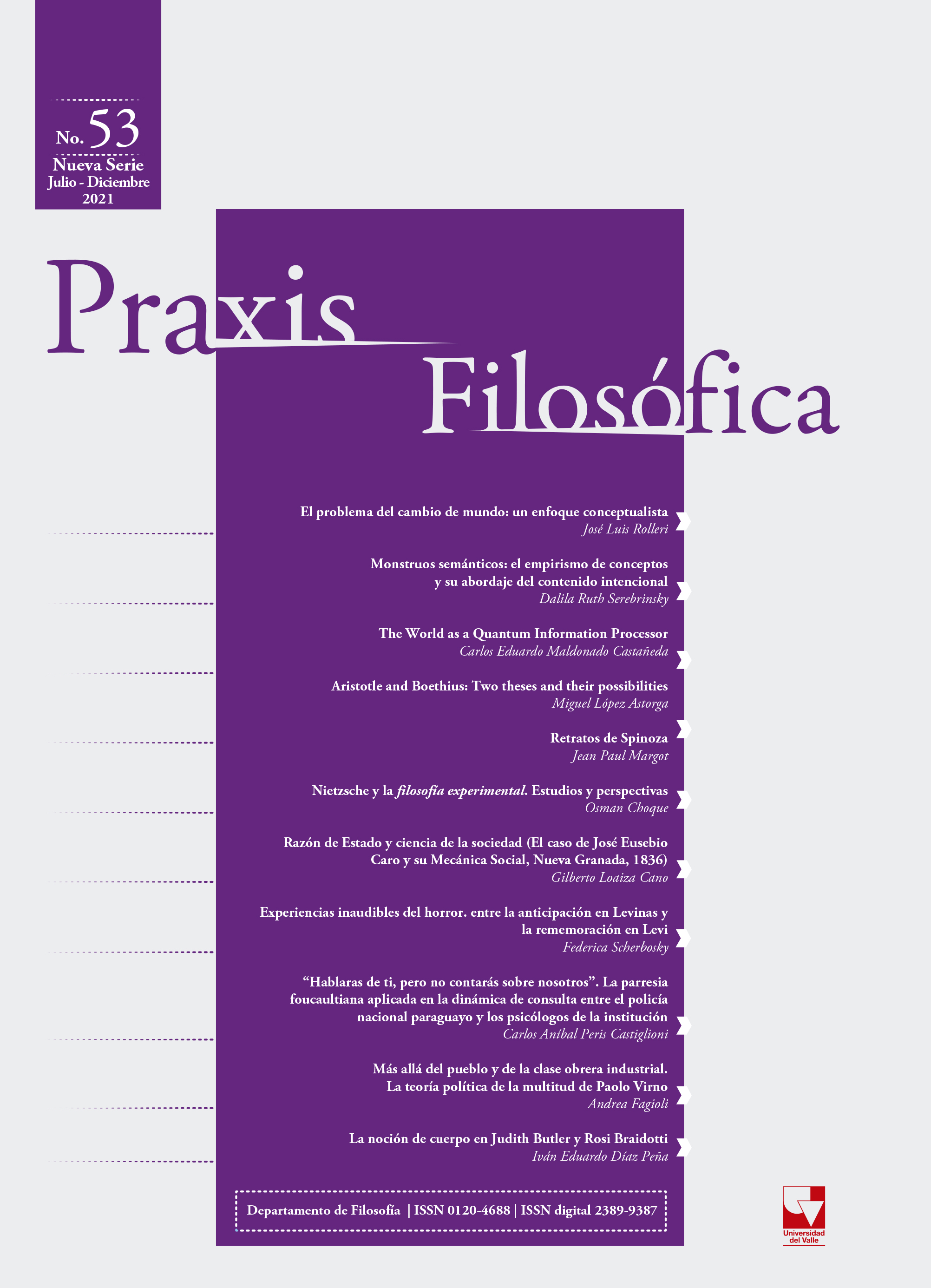Aristóteles y Boecio: dos tesis y sus posibilidades
Palabras claves:
Aristotle’s thesis ; Boethius’ thesis ; mental models ; modal logic ; possibility ;Contenido principal del artículo
Existe un tipo de tesis lógica que puede ser un problema cognitivo. Se trata de tesis que no son tautologías y que las personas tienden a aceptar como absolutamente correctas. Es el caso de tesis como las de Aristóteles o Boecio. Este trabajo trata de ofrecer una explicación de las razones por las que esto sucede. La explicación se basa en la teoría de los modelos mentales. No obstante, también recurre a la lógica modal y al análisis de los planteamientos presentados por Lenzen. Así, relacionando el marco general de la teoría de los modelos mentales con aspectos básicos de la lógica modal y con dicho análisis, se propone una posible solución al problema.
Bocheński, I. M. (1963). Ancient Formal Logic. North-Holland.
Byrne, R. M. J. & Johnson-Laird, P. N. (2020). If and or: Real and counterfactual possibilities in their truth and probability. Journal of Experimental Psychology: Learning, Memory, and Cognition, 46(4), 760-780. https://doi.org/10.1037/xlm0000756
Carnap, R. (1947). Meaning and Necessity: A Study in Semantics and Modal Logic. The University of Chicago Press.
Fitting, M. & Mendelsohn, R. L. (1998). First-Order Modal Logic. Kluwer Academic Publishers.
Johnson-Laird, P. N. (2010). Against logical form. Psychologica Belgica, 50(3/4), 193-221. http://doi.org/10.5334/pb-50-3-4-193
Johnson-Laird, P. N. (2012). Inference with mental models. In K. J. Holyoak & R. G. Morrison (Eds.), The Oxford Handbook of Thinking and Reasoning (pp. 134-145). Oxford University Press.
Johnson-Laird, P. N. & Byrne, R. M. J. (2002). Conditionals: A theory of meaning, pragmatics, and inference. Psychological Review, 109(4), 646-678. https://doi.org/10.1037/0033-295X.109.4.646
Johnson-Laird, P. N., Khemlani, S., & Goodwin, G. P. (2015a). Response to Baratgin et al.: Mental models integrate probability and deduction. Trends in Cognitive Science, 19(10), 548-549. https://doi.org/10.1016/j.tics.2015.06.014
Johnson-Laird, P. N., Khemlani, S., & Goodwin, G. P. (2015b). Logic, probability, and human reasoning. Trends in Cognitive Sciences, 19(4), 201-214. https://doi.org/10.1016/j.tics.2015.02.006
Johnson-Laird, P. N. & Ragni, M. (2019). Possibilities as the foundation of reasoning. Cognition, 193, 103950. https://doi.org/10.1016/j.cognition.2019.04.019
Khemlani, S., Byrne, R. M. J., & Johnson-Laird, P. N. (2018). Facts and possibilities: A model-based theory of sentential reasoning. Cognitive Science, 42(6), 1887-1924. https://doi.org/10.1111/cogs.12634
Khemlani, S., Hinterecker, T., & Johnson-Laird, P. N. (2017). The provenance of modal inference. In G. Gunzelmann, A. Howes, T. Tenbrink, & E. J. Davelaar (Eds.), Proceedings of the 39th Annual Conference of the Cognitive Science Society (pp. 259-264). Cognitive Science Society.
Kripke, S. A. (1963). Semantical analysis of modal logic I: Normal modal propositional calculi. Zeitschrift für Mathematische Logik und Grundlagen der Mathematik, 9, 67-96. https://doi.org/10.1002/malq.19630090502
Kripke, S. A. (1965). Semantical analysis of modal logic II: Non-normal modal propositional calculi. In J. W. Addison, L. Henkin, & A. Tarski (Eds.), The Theory of Models: Proceedings of the 1963 International Symposium at Berkeley (pp. 206-220). North-Holland Publishing Co.
Lenzen, W. (2019). Leibniz’s laws of consistency and the philosophical foundations of connexive logic. Logic and Logical Philosophy, 28(3), 537-551. http://dx.doi.org/10.12775/LLP.2019.004
López-Astorga, M. (2016a). Against Philo’s interpretation of the conditional: The case of Aristotle’s thesis. Agora. Papeles de Filosofía, 35(2), 51-64. https://doi.org/10.15304/ag.35.2.2542
López-Astorga, M. (2016b). Boethius’ Thesis: The connexivist interpretation of the conditional versus its semantic models. Información Filosófica, 13(24), 21-32.
López-Astorga, M. (2018). Iconic representations, possible worlds, and system K. Analele Universitatii din Craiova, Seria Filosofie, 42(2), 120-136.
López-Astorga, M. (2020). The modal square of opposition and the mental models theory. Epistemology & Philosophy of Science, 57(3), 75-86. https://doi.org/10.5840/eps202057343
McCall, S. (1975). Connexive implication. In A. R. Anderson & N. D. Belnap (Eds.), Entailment. The Logic of Relevance and Necessity. Volume I (pp. 434-446). Princeton University Press.
McCall, S. (2012). A history of connexivity. In D. M. Gabbay, F. J. Pelletier, & J. Woods (Eds.), Handbook of the History of Logic, Volume 11. Logic: A History of its Central Concepts (pp. 415-449). Elsevier.
O’Brien, D. P. (2014). Conditionals and disjunctions in mental-logic theory: A response to Liu and Chou (2012) and to López-Astorga (2013). Universum, 29(2), 221-235.
O’Toole, R. R., & Jennings, R. E. (2004). The Megarians and the Stoics. In D. M. Gabbay & J. Woods (Eds.), Handbook of the History of Logic, Volume 1. Greek, Indian and Arabic Logic (pp. 397-522). Elsevier.
Pfeifer, N. (2012). Experiments on Aristotle’s thesis: Towards an experimental philosophy of conditionals. The Monist, 95(2), 223-240. https://doi.org/10.5840/monist201295213
Quelhas, A. C., Rasga, C., & Johnson-Laird, P. N. (2017). A priori true and false conditionals. Cognitive Science, 41(55), 1003-1030. https://doi.org/10.1111/cogs.12479
Quelhas, A. C., Rasga, C., & Johnson-Laird, P. N. (2019). The analytic truth and falsity of disjunctions. Cognitive Science, 43(9), 1-27. https://doi.org/10.1111/cogs.12739
- Miguel López-Astorga, La teoría de la disciplina formal y la lógica mental (En) , Praxis Filosófica: Núm. 41 (2015): Praxis Filosófica No. 41 julio-diciembre 2015
- Miguel López-Astorga, ‘But’ and its role in the building of mental representations , Praxis Filosófica: Núm. 50 (2020): Núm. 50 (2020): Praxis Filosófica No. 50
- Miguel López-Astorga, La posibilidad de las cláusulas en el condicional y la disyunción , Praxis Filosófica: Núm. 57 (2023): Praxis Filosófica No. 57 julio-diciembre 2023
- Miguel López-Astorga, Cuantificadores, disyunción y valores de verdad con dos números , Praxis Filosófica: Núm. 62 (2025): Praxis Filosófica No. 62 julio-diciembre 2025
Aceptado 2021-07-22
Publicado 2021-08-15

Esta obra está bajo una licencia internacional Creative Commons Atribución-NoComercial-CompartirIgual 4.0.
De acuerdo con nuestra política (Licencia Creative Commons CC BY-NC-SA 4.0) los artículos presentados y sometidos al proceso editorial en la revista Praxis Filosófica no tienen costo alguno para sus autores ni retribuciones económicas para la revista. El artículo de carácter inédito, producto de investigación o de algún proyecto que se presente a Praxis Filosófica, no podrá estar sometido a otro proceso de publicación durante el proceso que se lleve en nuestra revista.





